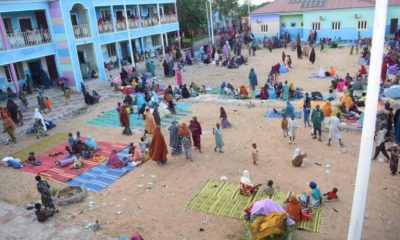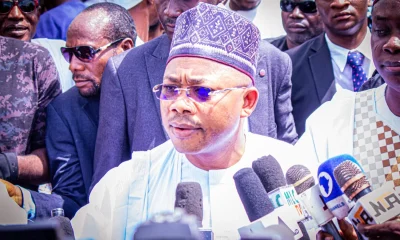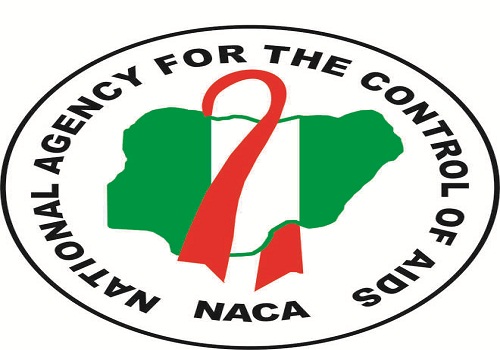NEWS
Graduation: Pray, be Close to your Children, Principal urges Parents

The Director/Principal, Queen’s College Lagos, Dr (Mrs) Tokunbo Yakubu-Oyinloye, has urged parents to be prayerful and close to their children, especially in the face of the social media influence.
Yakubu-Oyinloye gave the advice in an interview on the sidelines of the institution’s Speech and Prize Giving Day ceremony on Thursday in Lagos.
According to her, there is need for parents to step up efforts in inculcating the right moral values in their children, as the school cannot do it alone.
“Today, we are having our speech and prize giving day, a day to reward and honour our staff and students, to reward hard work, diligence and excellence.
“We are also looking at our students, those who performed well academically.
“We are not just looking at that, we are looking at other values. We have prizes for the most well behaved student, neatest student, most caring and even most improved student.
“For instance, If you were getting 20 per cent before and suddenly you now get 60 per cent, that means you have improved.
“We are also looking at our staff. We have some who go the extra mile, some dedicated and hard working. We are recognising all of these persons and rewarding them as well,” she said.
She called on our parents to strive hard to live up to their up to responsibilities by creating enough time for their children, given the influence of the social media on the young minds.
“It is no longer news that the social media has its negative sides, especially on young children, if not monitored.
“This, if left unchecked, may corrupt good manners and end up getting these children derailing,” the principal said.
She identified lack of supervision and mentoring as one of the challenges faced in nuturing children, especially the girl-child in the digital age.
Yakubu-Oyinloye said that parents must rise up to the occasion to ensure that children get the right values and become who they want to be.
She expressed regret that some parents were aiding and abetting children in terms of indiscipline.
According to her, it is unacceptable for parents to connive with their children to contravene school rules and regulations.
“A child who does such now will keep on doing it, even when they are out of school.
“When a child comes to school with contraband for instance, it is the parents that gave such a child the contraband.
“Some of the wrong attire and other contrabands they are caught with in school, are usually brought from home,” she stated.
The principal also fingered wrong role models as being responsible for moral decadence among children.
“In our time growing up, there was nothing like social media, including internet, but it is not the same thing now, because some of the things that they are exposed to, including the television and telephones, are things that can corrupt young minds.
“We also see people who are being seen as role models, that are not supposed to be.
“These children are easily attracted by the kind of lives they live, maybe because they have money that they throw around, including some of the music that are being played, which corrupt young minds.
“And this is where the parents must step up efforts in a bid to put these girls on the right path.
“Some of these parents will leave home early in the morning chasing money, only to get back home late. They must know that everything is not about money.
“You do not have to buy a smart phone or an Iphone for a six- year- old child, just because you have the money, because you may not be able to control what that child sees on that phone.
You may not be able to control the influences,” she said.
Yakubu-Oyinloye noted that the school was doing its best through its guidance and counseling unit, with moral and motivational talks usually held from time to time for the students.
She said that parents need to be very much involved in raising their children, especially the girls, as there was more to parenting than providing them with all they requested for.
“They must also strive to know the kind of friends their children are keeping. It is very important.
“This will help in knowing if the child is derailing. So, parents must be up and doing, by devoting a lot of time for their children, pray for them and counsel them,” she noted.
She called on the parents to further support the school in whatever way they could, as government could not do it all alone.
The principal noted that government over the years, had continued to support the college by providing the enabling environment for teaching and learning to thrive.
“I must therefore commend the Minister of Education, Malam Adamu Adamu and other top functionaries of the ministry, the Parents Teacher Association, the School Based Management Committee and the Old Girls for their various interventions in the college.
“I want to urge the Old Girls of the college to always join hands in lifting their alma mater to its desired height, having been established in 1927.
“Let them join hands with the school and contribute the much they can, to ensure that we have a school system of our dream, so as to achieve the much desired national development,” she said.
The principal stated that the college was faced with challenges in the area of dearth of both teaching and non teaching staff, aging infrastructure and inadequate vehicles for mobility.
She said that given the astronomical increase in cost of energy, arising from increased cost of diesel and electricity tariff, there was need for a solar-power plant.
Also speaking, the Chairman of the PTA. Mr Damola Adewuyi, urged the graduating students to remain focused and shun all forms of distraction.(NAN)
NEWS
FG Imposes 7-year Ban on New Federal Tertiary Institutions

The Federal Executive Council (FEC) has approved a seven-year moratorium on the establishment of new federal tertiary institutions.
Dr Tunji Alausa, Minister of Education announced the approval, after Wednesday’s FEC meeting, presided over by President Bola Tinubu at the Presidential Villa, Abuja.
He explained the ban applies to all federal universities, polytechnics, and colleges of education.
According to Alausa, the decision aims to address systemic decay caused by unregulated expansion.
”What we are witnessing today is duplication of new federal tertiary institutions, a significant reduction in the current capacity of each institution, and degradation of both physical infrastructure and manpower.
”“If we do not act decisively, it will lead to marked declines in educational quality and undermine the international respect that Nigerian graduates command.”
“We are doing this to further halt decays in tertiary institutions which may in future affect the quality of education and consequently cause unemployment of graduates from some of these institutions.”
Alausa noted Nigeria currently has 72 federal universities, 108 state universities, and 159 private universities with similar trends in polytechnics and colleges of education.
He pointed to a growing mismatch between the number of institutions and available student enrollment.
He cited a northern university with fewer than 800 students but over 1,200 staff, calling it unsustainable.
The minister described the moratorium as a bold corrective measure by the Tinubu administration.
He said the government would now focus on upgrading existing institutions, improving infrastructure, boosting manpower, and increasing capacity.
“We need to improve the quality of our education system and increase the carrying capacity of our current institutions so that Nigerian graduates can maintain and enhance the respect they enjoy globally.”
The minister however announced that the Council approved 9 new private universities out of the 79 active requests pending applications.
”Several of these applications have been in the pipeline for over six years, with investors having already built campuses and invested billions of Naira,” he explained.
“Due to inefficiencies within the NUC, approvals were delayed. We have since introduced reforms to streamline these processes, and today’s approvals are a result of clearing this backlog.”
(NAN)
Foreign News
CAF Sanctions Kenya Again over Crowd Trouble

The Confederation of African Football (CAF) has sanctioned African Nations Championship (CHAN) co-host, Kenya, for the second time in as many weeks over security breaches.
In a statement made available on Monday evening, the continental governing body said that it has limited entry to the 48,000-seat Moi International Sports Centre.
It also said that, known as Kasarani Stadium, can accommodate 27,000 fans for Sunday’s Group A match between Kenya and Zambia.
CAF said only electronic ticket holders would be allowed into the stadium, with thermal tickets prohibited.
The governing body warned that Kenya’s matches could be relocated from Kasarani Stadium if organisers fail to prevent further breaches.
“We trust these measures will be applied swiftly to protect competition’s integrity, ensure fan safety, and uphold confidence in Kenya’s commitment to the tournament,” CAF said.
The sanctions follow incidents on Aug. 10 when Kenya defeated two-time winner Morocco 1-0 in spite of playing the entire second half with 10 men.
The win put Kenya top of Group A with seven points.
The debutants would reach the quarterfinals with at least a draw against winless Zambia.
Last week, Kenya’s football federation was fined nearly 20,000 U.S. dollars for security lapses during the team’s 1-0 win over DR Congo in the tournament opener on Aug. 3.
In the latest case, CAF cited major lapses, including stadium gates and restricted service areas being overrun by ticketless spectators and holders of government-distributed physical tickets.
It also accused security personnel of losing control at exit points and allowing breaches of the perimeter fence that enabled thousands of ticketless fans to enter.
CAF had expressed alarm over the use of tear gas and flash grenades, reports of live ammunition fired near spectators and staff, and violent incidents such as stone-throwing at security personnel.
It also cited unsafe vehicle movement in spectator areas, inadequate police response, and the lack of medical incident reports in spite of injuries being reported.
Organisers were further criticised for insufficient communication tools and the absence of CCTV coverage at critical entry points.
Education
Varsity Don Advocates Establishment of National Bureau for Ethnic Relations, Inter-Group Unity

By David Torough, Abuja
A university scholar, Prof. Uji Wilfred of the Department of History and International Studies, Federal University of Lafia, has called on the Federal Government to establish a National Bureau for Ethnic Relations to strengthen inter-group unity and address the deep-seated ethnic tensions in Nigeria, particularly in the North Central region.
Prof.
Wilfred, in a paper drawing from years of research, argued that the six states of the North Central—Kwara, Niger, Kogi, Benue, Plateau, and Nasarawa share long-standing historical, cultural, and economic ties that have been eroded by arbitrary state boundaries and ethnic politics.According to him, pre-colonial North Central Nigeria was home to a rich mix of ethnic groups—including Nupe, Gwari, Gbagi, Eggon, Igala, Idoma, Jukun, Alago, Tiv, Birom, Tarok, Angas, among others, who coexisted through indigenous peace mechanisms.
These communities, he noted, were amalgamated by British colonial authorities under the Northern Region, first headquartered in Lokoja before being moved to Kaduna.
He stressed that state creation, which was intended to promote minority inclusion, has in some cases fueled exclusionary politics and ethnic tensions. “It is historically misleading,” Wilfred stated, “to regard certain ethnic nationalities as mere tenant settlers in states where they have deep indigenous roots.”
The don warned that such narratives have been exploited by political elites for land grabbing, ethnic cleansing, and violent conflicts, undermining security in the sub-region.
He likened Nigeria’s ethnic question to America’s historic “race question” and urged the adoption of structures similar to the Freedmen’s Bureau, which addressed racial inequality in post-emancipation America through affirmative action and equitable representation.
Wilfred acknowledged the recent creation of the North Central Development Commission by President Bola Tinubu as a step in the right direction, but said its mandate may not be sufficient to address ethnic relations.
He urged the federal government to either expand the commission’s role or create a dedicated Bureau for Ethnic Relations in all six geo-political zones to foster reconciliation, equality, and sustainable development.
Quoting African-American scholar W.E.B. Du Bois, Prof. Wilfred concluded that the challenge of Nigeria in the 21st century is fundamentally one of ethnic relations, which must be addressed with deliberate policies for unity and integration.




























